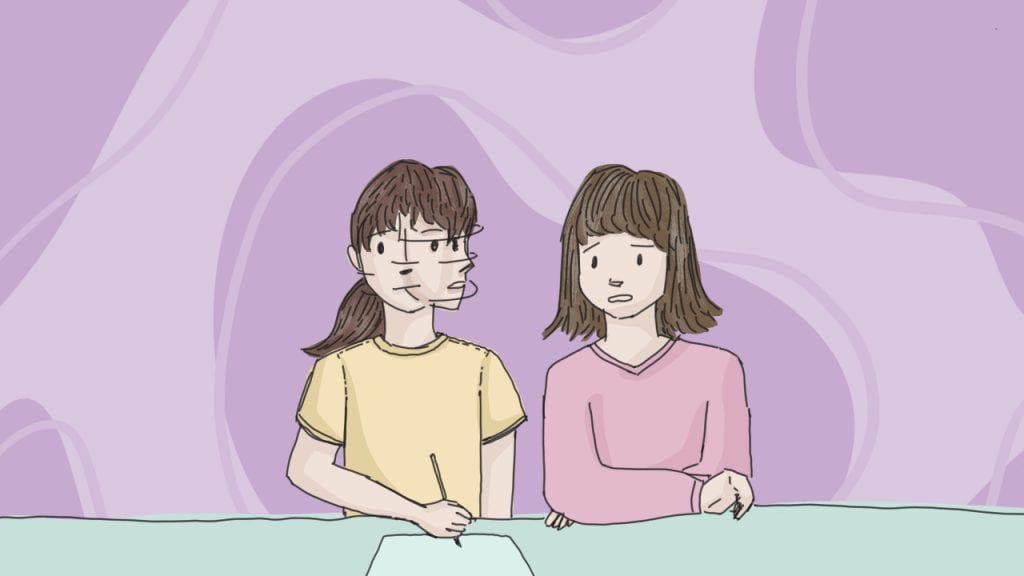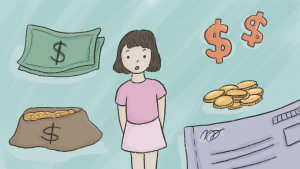
Choices: How Do I Draw A Fine Line Between Focusing On My Studies And Helping My Sad Friend?

Life’s hard, school’s tough and sometimes we are the helping hands. We cope with our studies and we take care of friends who are dealing with sadness. It might possibly take a toll on us at times, but yet we feel the need to help our friend. So how exactly do we draw a fine line between focusing on ourselves and our studies and helping our friends? Here’s some questions you can ask yourself which may help you in figuring out where the fine line is.
1. Are you helping or enabling your friend?
The most important step to drawing the line on how much you should help your friend, is to identify whether you are helping your friend, or enabling your friend. So what is ‘enabling’? It is when you are supporting a harmful behaviour of your friend’s, and always solving your friend’s problems instead of empowering your friend to become more able to solve his/her problems by himself/herself. Does this mean we should only observe on the sidelines and give encouragement at a distance, so that our friend doesn’t depend on us too much? Well, the amount of help you give your friend is more or less a continuum. As long as you don’t breach the line of enabling a bad behaviour of your friend’s, the amount of help you give should usually depend on the type of help your friend asks for. Every individual assigns a different value to the type of help given. To some, a word of encouragement may seem like a low-effort support. But to others, a word of encouragement and giving personal space to come up with their own solutions could be exactly what they need. Of course, sometimes enabling can occur out of fear, self-protection or simply a misguided act of care and love. It is okay to accidentally end up enabling our sad friend. What’s most important is that we do not continue to feed on it. I believe your good friend will also remember that you are simply trying your best, despite going in the wrong way sometimes. At the end of the day, what matters is that we still try our best to think from our sad friend’s perspective, and never stop trying to find the best way to help our sad friend, without compromising too much of our own well-being.
2. Do you find it hard to catch up with your study commitments?
Maybe it’s a red light that signals a stop to you when you find yourself frantically struggling to keep up with school work, your grades dwindling, or when you simply don’t remember a single thing the teacher says even after going for a week of lessons. This is the time when you reconsider whether you’ve been putting too much time and effort into helping your sad friend. Of course, this shouldn’t call for a total stop, and you should not leave your sad friend alone. But remember, a sad friend is still a dear friend of yours. If you sincerely express your genuine concern for your academic performance, and need time to catch up with studies, go ahead. If your sad friend attempts to hold onto you tightly instead of letting you re-balance your priorities, then perhaps you need to seek additional help for your friend. If your sad friend is concerned about academic issues, you two can always look for external help such as consultations with your school teachers, taking tuition classes outside, or engaging a private tutor who’s more flexible with time to help the both of you in a personalized manner. If your sad friend has other more personal problems that need to be overcome, getting other possible friends to share the burden together, or if necessary, seeking a trusted adult to speak to would be good.
3. Do you think you are still capable of helping your friend?
When you are feeling stressed emotionally, or drained physically, do not ignore the signs that your mind and body are trying to give you. In order to help your sad friend to the best of your ability, you need to be taking good care of yourself first. Never bottle things up for a long time thinking that you need to shoulder your own burdens, since your friend is already sad. Speak to another friend, or find outlets to express your struggle at. It is never easy to be that constant support for your sad friend. As much as you want to help your friend, give yourself timely checks to make sure you are still capable of helping your friend physically, mentally, and logistically. When you recognize that you need more help, get help for yourself. Overly-exerting pressure unto yourself will be counter-productive. Think about it: your friend will certainly feel happier if you are happier too.
All in all, FamilyTutor as a tuition agency in Singapore is actually immensely proud of you for caring for your friends around you. You are one of the gems in the world who make the world a better place to live in! Remember to care about yourself too okay!
By the way, the ‘Simply Advice’ series conveniently gives you information that is useful any day any time. It aims to shed some light on pertinent topics and provide you with the best advice!

Zoe
Zoe is an undergraduate student in Singapore who loves thinking deeply and translating them into writing. She hopes her reflective opinions and sound advice weaved into relevant articles will be useful for you in one way or another!
Tell Zoe Below What You Think About Her Post!

About FamilyTutor!
FamilyTutor is an established home tuition agency in Singapore! We match suitable home tutors for our clients not just to improve the students' academic grades, but also to build a strong rapport and meaningful relationship with the students and even the their whole family. FamilyTutor put every student in good hands!
If you need an excellent home tutor, feel free to call/WhatsApp us at +65 8777-2168! Our matching service is free!
Related Posts!
Follow Us On Facebook!
Education Levels
National Exams
Math & Science Subjects
Language Subjects
Japanese Tuition
Korean Tuition
German Tuition
Humanities Subjects
Social Studies
Chinese Literature Tuition
About Us
FamilyTutor is an established and the people’s favourite home tuition agency in Singapore! We match a suitable tutor for you not just to improve the student’s grade, but also to build a good rapport and meaningful relationship with the student and even with the student’s whole family! With FamilyTutor, every Singaporean son & daughter is in good hands.
Contact Us
- 8777 2168
- 8777 2168
- Mon-Sun 9am-10pm (Including PH)
- contactus@familytutor.sg
- 17 Petir Road Singapore 678278



